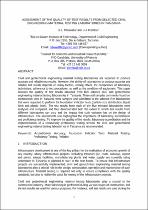 ResearchSpace
ResearchSpace
Assessment of the quality of test results from selected civil engineering material testing laboratories in Tanzania
JavaScript is disabled for your browser. Some features of this site may not work without it.
- ResearchSpace
- →
- Research Publications/Outputs
- →
- Conference Publications
- →
- View Item
| dc.contributor.author |
Mbawala, SJ

|
|
| dc.contributor.author |
Komba, Julius J

|
|
| dc.date.accessioned | 2017-12-19T12:39:37Z | |
| dc.date.available | 2017-12-19T12:39:37Z | |
| dc.date.issued | 2017-12 | |
| dc.identifier.citation | Mbawala, S.J. and Komba, J.J. 2017. Assessment of the quality of test results from selected civil engineering material testing laboratories in Tanzania. 29th National Conference of the Institution of Engineers Tanzania, 7-9 December 2017, Naura Springs Hotel, Arusha, Tanzania | en_US |
| dc.identifier.uri | http://hdl.handle.net/10204/9892 | |
| dc.description | Paper presented at the 29th National Conference of the Institution of Engineers Tanzania, 7-9 December 2017, Naura Springs Hotel, Arusha, Tanzania | en_US |
| dc.description.abstract | Civil and geotechnical engineering material testing laboratories are expected to produce accurate and reliable test results. However, the ability of laboratories to produce accurate and reliable test results depends on many factors, among others, the competence of laboratory technicians, adherence to test procedures, as well as the condition of equipment. This paper assesses the quality of test results obtained from five selected civil and geotechnical engineering material testing laboratories in Tanzania. Three soil samples commonly found on construction sites in Tanzania were sampled and submitted to the selected five laboratories that were requested to perform the foundation indicator tests (particle size distribution, liquid limit and plastic limit). The test results from each of the five selected laboratories were analysed and compared, and thus demonstrated both the extent to which test results from different laboratories can vary and the impact that such variance has on the design of infrastructure. The assessments also highlighted the importance of laboratory accreditation and proficiency testing. To improve the quality of the results, laboratory accreditation and the implementation of a compulsory proficiency testing scheme for civil and geotechnical engineering material testing laboratories in Tanzania are recommended. | en_US |
| dc.language.iso | en | en_US |
| dc.relation.ispartofseries | Worklist;19998 | |
| dc.subject | Accreditation | en_US |
| dc.subject | Accuracy | en_US |
| dc.subject | Foundation indicator tests | en_US |
| dc.subject | Material testing | en_US |
| dc.subject | Proficiency testing | en_US |
| dc.title | Assessment of the quality of test results from selected civil engineering material testing laboratories in Tanzania | en_US |
| dc.type | Conference Presentation | en_US |
| dc.identifier.apacitation | Mbawala, S., & Komba, J. J. (2017). Assessment of the quality of test results from selected civil engineering material testing laboratories in Tanzania. http://hdl.handle.net/10204/9892 | en_ZA |
| dc.identifier.chicagocitation | Mbawala, SJ, and Julius J Komba. "Assessment of the quality of test results from selected civil engineering material testing laboratories in Tanzania." (2017): http://hdl.handle.net/10204/9892 | en_ZA |
| dc.identifier.vancouvercitation | Mbawala S, Komba JJ, Assessment of the quality of test results from selected civil engineering material testing laboratories in Tanzania; 2017. http://hdl.handle.net/10204/9892 . | en_ZA |
| dc.identifier.ris | TY - Conference Presentation AU - Mbawala, SJ AU - Komba, Julius J AB - Civil and geotechnical engineering material testing laboratories are expected to produce accurate and reliable test results. However, the ability of laboratories to produce accurate and reliable test results depends on many factors, among others, the competence of laboratory technicians, adherence to test procedures, as well as the condition of equipment. This paper assesses the quality of test results obtained from five selected civil and geotechnical engineering material testing laboratories in Tanzania. Three soil samples commonly found on construction sites in Tanzania were sampled and submitted to the selected five laboratories that were requested to perform the foundation indicator tests (particle size distribution, liquid limit and plastic limit). The test results from each of the five selected laboratories were analysed and compared, and thus demonstrated both the extent to which test results from different laboratories can vary and the impact that such variance has on the design of infrastructure. The assessments also highlighted the importance of laboratory accreditation and proficiency testing. To improve the quality of the results, laboratory accreditation and the implementation of a compulsory proficiency testing scheme for civil and geotechnical engineering material testing laboratories in Tanzania are recommended. DA - 2017-12 DB - ResearchSpace DP - CSIR KW - Accreditation KW - Accuracy KW - Foundation indicator tests KW - Material testing KW - Proficiency testing LK - https://researchspace.csir.co.za PY - 2017 T1 - Assessment of the quality of test results from selected civil engineering material testing laboratories in Tanzania TI - Assessment of the quality of test results from selected civil engineering material testing laboratories in Tanzania UR - http://hdl.handle.net/10204/9892 ER - | en_ZA |





